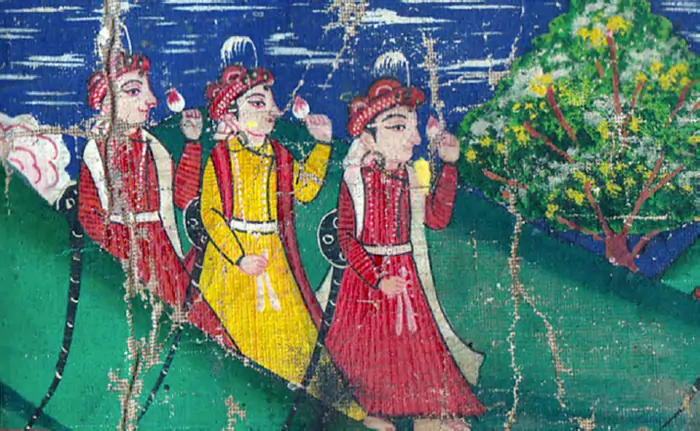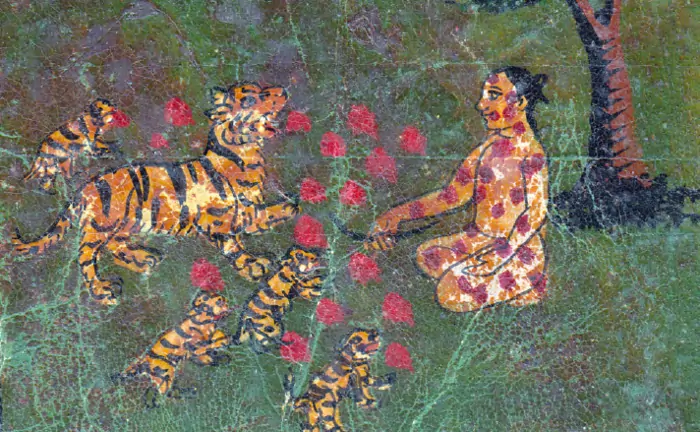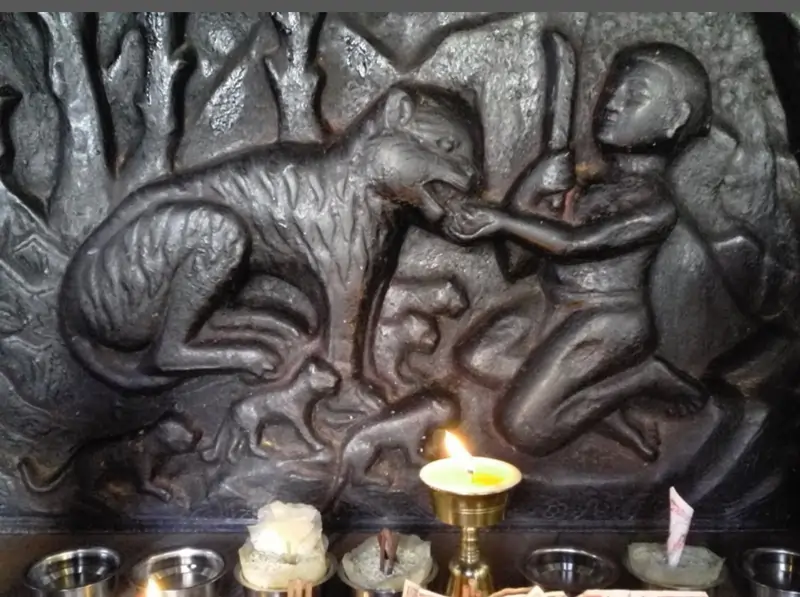A Royal Family’s Joyful Life
Once, in the majestic land of Gandhabatipur, ruled King Maharath, a revered leader. He led a life of contentment with his beloved wife, Queen Satyabati, and their three sons, Mahapranad, Mahadev, and the youngest, Mahasattva. This story passed down through the ages, tells of Mahasattva’s extraordinary sacrifice, a tale that echoes through time as a testament to his profound compassion and bravery.
A Fateful Journey into the Forest
One sunny day, King Maharath, yearning for adventure, organized a grand outing into the wilderness with his sons, ministers, and guards. Their destination was the enchanting Gandhaman Parbat, a mountain wrapped in mystery and natural beauty. As they ventured into the forest, the three princes, filled with youthful exuberance, frolicked amongst the trees, their laughter echoing through the woods. They swam in crystal-clear waters and playfully tossed flowers at each other, oblivious to the world beyond the forest’s embrace.

Lost in the Wilderness
Amid their carefree exploration, the princes strayed far from their entourage, losing their way. The realization of being lost struck them hard, especially Mahapranad, the eldest, who was gripped by fear. Mahadev, too, grew anxious, voicing his concerns about finding their way back. However, Mahasattva, unperturbed by their predicament, continued to relish the beauty of nature, a serene smile on his face. Unknown to them, back at the camp, their father, King Maharath, and his men embarked on a frantic search for the missing princes, their hearts heavy with worry.
A Life-Altering Encounter
As the brothers delved deeper into the forest, they stumbled upon a sight that would change their lives forever. There, weakened and frail, lay a tigress with her five starving cubs. Mahasattva’s heart ached at the sight, his compassion stirred by their plight. Inquiring about the tigress’s diet, Mahapranad informed him that tigers survive solely on meat. A profound realization dawned upon Mahasattva. He saw an opportunity to make a sacrifice so monumental that it would forever be remembered.

The Ultimate Sacrifice
Mamapranad, the elder brother, urged everyone to return, but Prince Mahasattva was resolute in his decision to sacrifice himself to save a starving tigress. Contemplating the transient nature of human life, dominated by basic desires and an inevitable end, he saw greater value in offering his body to the famished tigers. Claiming he had forgotten to bring flowers, he returned to the forest, where he stripped off his clothes and ornaments, hand in the tree, and deliberately presented himself to the tigress. However, the tigress was too weak to eat him, prompting Mahasattva to take a more drastic step.
Using a sword, Mahasattva began to feed the tigress by cutting his own flesh, eventually cutting his throat to lay before her. The tigress and her cubs consumed his body, fulfilling his noble act of sacrifice. This selfless deed caused the earth to tremble in mourning, and celestial beings descended to honor Mahasattva’s ultimate sacrifice, recognizing his profound compassion and bravery.

The Legacy of a Compassionate Prince
King Maharath, upon returning, discovered the tragic fate of his youngest son. In deep sorrow, he collected Mahasattva’s remains and built a stupa, a sacred monument, in his memory. This stupa, known as Om Namo Buddha Chaitya or Namura Chaitya in Newari, stands to this day in Namo Buddha, Nepal, a testament to Mahasattva’s selflessness.

Conclusion: A Tale of Unparalleled Sacrifice
This poignant story, believed to be recounted by Lord Buddha himself, reflects on his past life as Mahasattva. It serves as a powerful reminder of the profound impact of selflessness and compassion. Mahasattva’s sacrifice, immortalized in the hearts of those who hear his story, continues to inspire and awaken the spirit of altruism in humanity.
Location Map
Google map of the location where Mahasattva is believed to have sacrificed himself to Tigress. A must-visit Buddhist destination.
Frequently Asked Questions
1. Who was Mahasattva?
Mahasattva was the youngest son of King Maharath and Queen Satyabati from Gandhabatipur. He is remembered for his extraordinary sacrifice and compassion by feeding himself to tigress and hungry cubs. He is believed to be the previous life of Shakyamuni Buddha.
2. What prompted Mahasattva’s journey into the forest?
The journey was initiated by King Maharath, who yearned for an adventure with his sons, ministers, and guards. They ventured into the wilderness towards Gandhaman Parbat, a mountain known for its beauty and mystery.
3. What significant encounter did the Mahasattva have in the forest?
He came across a weakened tigress with her five starving cubs. This sight deeply moved Mahasattva, stirring his compassion.
4. What was Mahasattva’s sacrifice?
Understanding that the tigress and her cubs needed meat to survive, Mahasattva decided to sacrifice himself. He fed himself to the tigress, first by cutting his own flesh and eventually his throat, to save her and her cubs from starvation.
5. What happened after Mahasattva’s sacrifice?
King Maharath, upon discovering his son’s fate, mourned deeply. He collected Mahasattva’s remains and built a stupa (Om Namo Buddha Chaitya) in his memory in Namo Buddha, Nepal.
6. What does Mahasattva’s story symbolize?
The story is a powerful testament to selflessness and compassion. It is believed to be a recount of Lord Buddha’s past life, emphasizing the impact of altruism in humanity.
7. Is there a physical monument dedicated to Mahasattva?
Yes, the stupa known as Om Namo Buddha Chaitya or Namura Chaitya in Newari, located in Namo Buddha, Nepal, stands as a sacred monument honoring Mahasattva’s sacrifice.
8. Why is Mahasattva’s story important?
Mahasattva’s story is a poignant reminder of the profound virtues of selflessness and compassion. It continues to inspire and awaken a spirit of altruism in those who hear it.
References
- MAHASATTVA, Kamal Ratna Tuladhar, 2022

